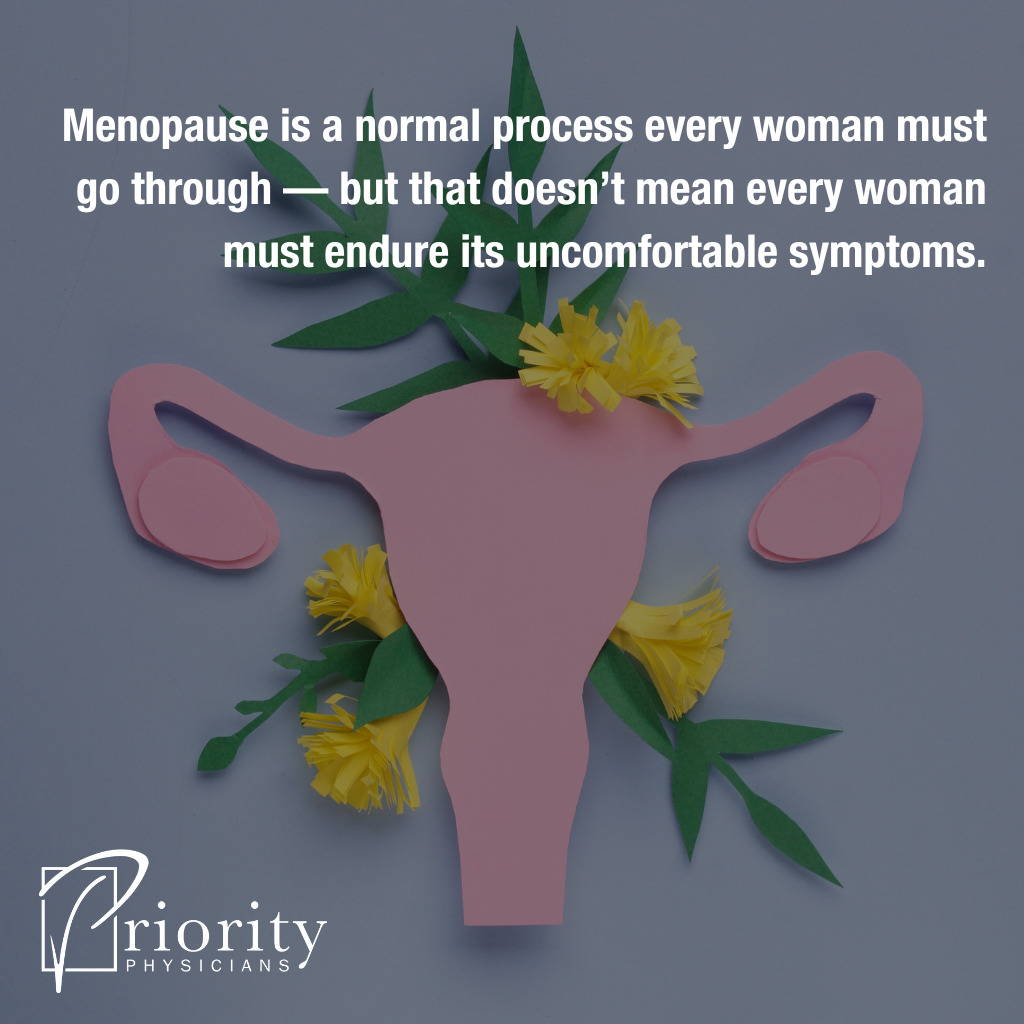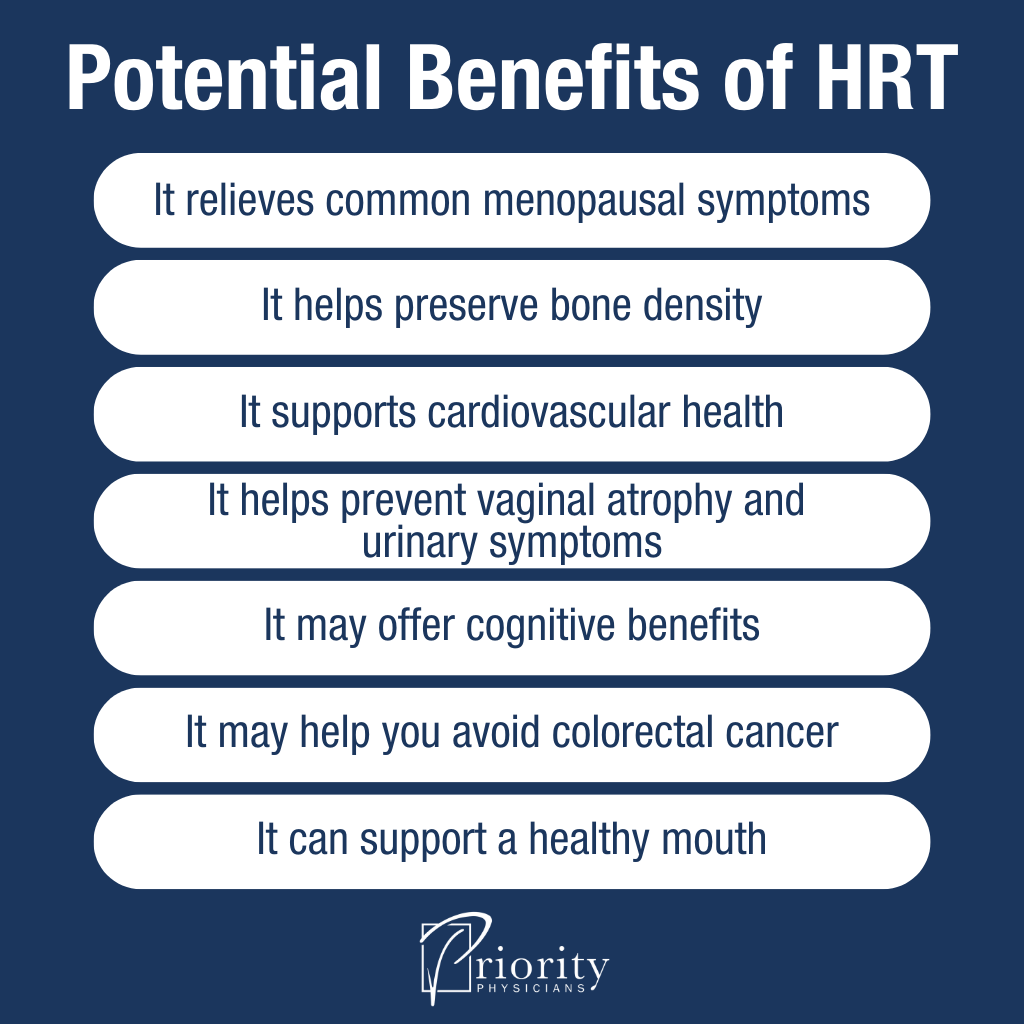Some women navigate menopause easily, without physical or emotional challenges. They’re the lucky ones.
For others, when menopause hits, it hits hard, bringing hot flashes and night sweats, depression and mood changes, insomnia and decreased libido.
If you’re approaching or already experiencing menopause, hormone replacement therapy (HRT) can be a safe and very effective way to help you manage difficult or bothersome symptoms.
But wait. At one time, didn’t your mom (or your aunt or your best friend) tell you hormone therapy for women is “bad”?
That’s 20-year-old thinking, say medical researchers. Dozens of recent studies indicate that HRT can be quite beneficial to a woman’s health. So, if you’re approaching, mid-, or post-menopause and struggle with adverse symptoms, it’s definitely time for a fresh look at hormone therapy for women. Let’s begin the conversation.
Here we’ll explain why doctors once had concerns about HRT and how those concerns became disputed. Then we’ll look at how today’s HRT can improve quality of life for women nearing or mid-menopause.

20 Years Ago: Doctors Worried About Women’s Hormone Therapy
Let’s reflect back on the state of hormone therapy at the start of our new millennium.
Throughout the late 1990s and early 2000s, hormone therapy was considered a shining star in healthcare. HRT was believed to have significant potential not just to treat menopausal discomfort but also to fight the onset of many chronic diseases caused by aging in women.
In 2002, the Women’s Health Initiative (WHI), a long-term national study, enrolled over 27,000 post-menopausal women, 50–79 years of age, in women’s hormone therapy trials. The trials aimed to see if and how HRT might help women avoid coronary heart disease, stroke and pulmonary embolism, colorectal and endometrial cancers, cognitive issues, and other diseases.
However, the results were surprising. Trial data seemed to indicate that hormone therapy could potentially increase the risk of disease in some women.
Doctors debated whether to continue HRT in the nearly 40% of postmenopausal women already using it. In the end, eight out of every 10 of those women dropped the therapy, on their doctors’ advice.
Today: We Know the Benefits of Hormone Therapy for Women Outweigh the Risks
By the 2010s, one thing became apparent to medical researchers: the earlier alarm over HRT had been unnecessary.
Women in their 50s, 60s, and even 70s show great variety in their lifestyles, needs, and health conditions. They have more differences than similarities. Yet much of the 2002 WHI trial data had been generalized across all women.
The result? It far overstated the potential dangers of hormone therapy for women.
Researchers began to normalize and reinterpret the results, and they conducted further studies into the 2020s. Here’s what we know now:
- For healthy women 60 and under who have started menopause 10 years earlier or less, the benefits of hormone therapy for women can outweigh the risks.
- Overall, women who start hormone therapy before age 60 have a 39% lower risk of death than women who don’t, according to an analysis of results from 30 recent clinical trials.
Far from creating cardiovascular issues (as we feared in 2002), newer studies conclude that HRT may significantly reduce the risk of heart disease and stroke and improve cardiovascular health in postmenopausal women ages 45–60. And according to the American Cancer Society, estrogen-only HRT is not linked to a higher risk of breast cancer (another earlier fear).
Individual experience can vary, of course, but here’s a summary of the potential benefits associated with HRT:
- It relieves common menopausal symptoms: HRT can be effective in reducing hot flashes, night sweats, mood swings, irritability, sleep disturbances, and vaginal dryness.
- It helps preserve bone density: Estrogen plays a crucial role in maintaining bone strength. HRT can prevent or slow the loss of bone density that occurs during menopause. This reduces the risk of osteoporosis, a condition characterized by weakened and fragile bones that are more vulnerable to fractures.
- It supports cardiovascular health: Estrogen has a positive impact on heart health by helping maintain healthy blood vessels and regulate cholesterol levels. Started at the right time, HRT can reduce the risk of cardiovascular diseases, including heart disease and stroke, in postmenopausal women.
- It helps prevent vaginal atrophy and urinary symptoms: HRT can improve vaginal health by reducing dryness, thinning of the vaginal lining, and discomfort during intercourse. It may also alleviate urinary frequency, urgency, and incontinence.
- It may offer cognitive benefits: Some studies suggest HRT can improve cognitive function and reduce the risk of cognitive decline and dementia in women during the menopausal transition. Research in this area is ongoing.
- It may help you avoid colorectal cancer: Some studies suggest long-term use of HRT may be associated with a reduced risk of developing colorectal cancer.
- It can support a healthy mouth: Estrogen deficiency during menopause is linked to greater risk of tooth loss. HRT may help with oral health by maintaining healthy gum tissue and preserving bone in the jaw.

It’s Time for a Talk With Your Doctor About Hormone Therapy for Women
During menopause, natural levels of female hormones — estrogen and progesterone — tend to dip substantially. (Did you know that the average man has more estrogen than the average postmenopausal woman?) Your physician may recommend one or more medications containing these hormones in order to supplement your body’s natural levels.
To determine the best course of hormone replacement therapy for your needs, the North American Menopause Society (NAMS) recommends that you and your doctor have decision-making conversations that consider your age and menopausal symptoms, your personal and family medical history, and any current conditions you have or medications you take. Together, you can agree on the right course of hormone replacement therapy for your unique profile and decide how long to follow it.
Depending on what works best for you personally, supplemental hormones can be delivered orally or through a patch, gel, spray, suppository, or ring. Your doctor will help to track and control your progress on HRT and will adjust your therapy if needed.
More advanced age factors and health conditions can impact the treatment plan. If you’ve reached your 60s or beyond — or have a more serious medical history or existing condition — your advising doctor will help you carefully consider whether HRT is a good choice for you.
The conversation, however, is well worth having.
Hormone Therapy for Women: The Takeaway
Menopause is a normal process every woman must go through — but that doesn’t mean every woman must endure its uncomfortable symptoms.
At Priority Physicians, we know things can get a little uncomfortable during this transitional time, and a focus on your quality of life becomes essential. Hormone therapy for women may be right for you, or it might not. We’re here to have those important conversations and to help you along the journey.

